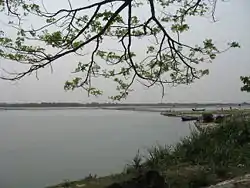Torsa River
Torsa River (also spelt Torsha and also known as Kambu Maqu, Machu and Amo Chhu) rises from the Chumbi Valley in Tibet, China, where it is known as Machu. It flows into Bhutan, where it is known as the Amo Chu. It has total length of 358 kilometres (222 mi), out of which 113 kilometres (70 mi) is in China and 145 kilometres (90 mi) in Bhutan before flowing into the northern part of West Bengal in India.[1]
| Torsa River Machu, Amo Chhu | |
|---|---|
 Torsa River near Cooch Behar | |
 | |
| Location | |
| Country | China, Bhutan, India, Bangladesh |
| Cities | Phuntsholing, Jaigaon, Cooch Behar |
| Physical characteristics | |
| Mouth | Brahmaputra River |
| Length | 358 km (222 mi) |
| Basin features | |
| Tributaries | |
| • left | Kaljani |
It flows past the important border towns of Phuntsholing (in Bhutan) and Jaigaon (on the Indian side of the border) and past the great tea estate of Dalsingpara and the Jaldapara National Park. The beautiful landscape here is ideal for family picnics, and the wildlife sanctuary has tigers, rhinoceros and deer of many varieties. a tributary known as Buri Torsa meets Jaldhaka. Ghargharia river meets with Torsa in the Tufanganj subdivision, near Deocharai and Balarampur Torsa meets with Kaljani and it then flows into Bangladesh by the name of Kaljani and meets with Brahmaputra in BD. A distributary known as Buri Torsa meets Jaldhaka.
Ghargharia river meets with Torsa in the Tufanganj subdivision, near Deocharai and Balarampur Torsa meets with Kaljani and it then flows into Bangladesh by the name of Kaljani and meets with the Jamuna there.
Major towns
Major towns on its banks are:
- Phuntsholing, in Bhutan
- Cooch Behar, in India
- Torsa Strict Nature Reserve, upstream in Bhutan
Hydro projects
- Amo chu Hydro Power Project, By NTPC Limited
See also
References
- Bandopadhyay, Dilip Kumar, Bharater Nadi (Rivers of India), 2002, (in Bengali), p. 78, Bharati Book Stall, 6B Ramanath Mazumdar Street, Kolkata
| Wikimedia Commons has media related to Torsa River. |